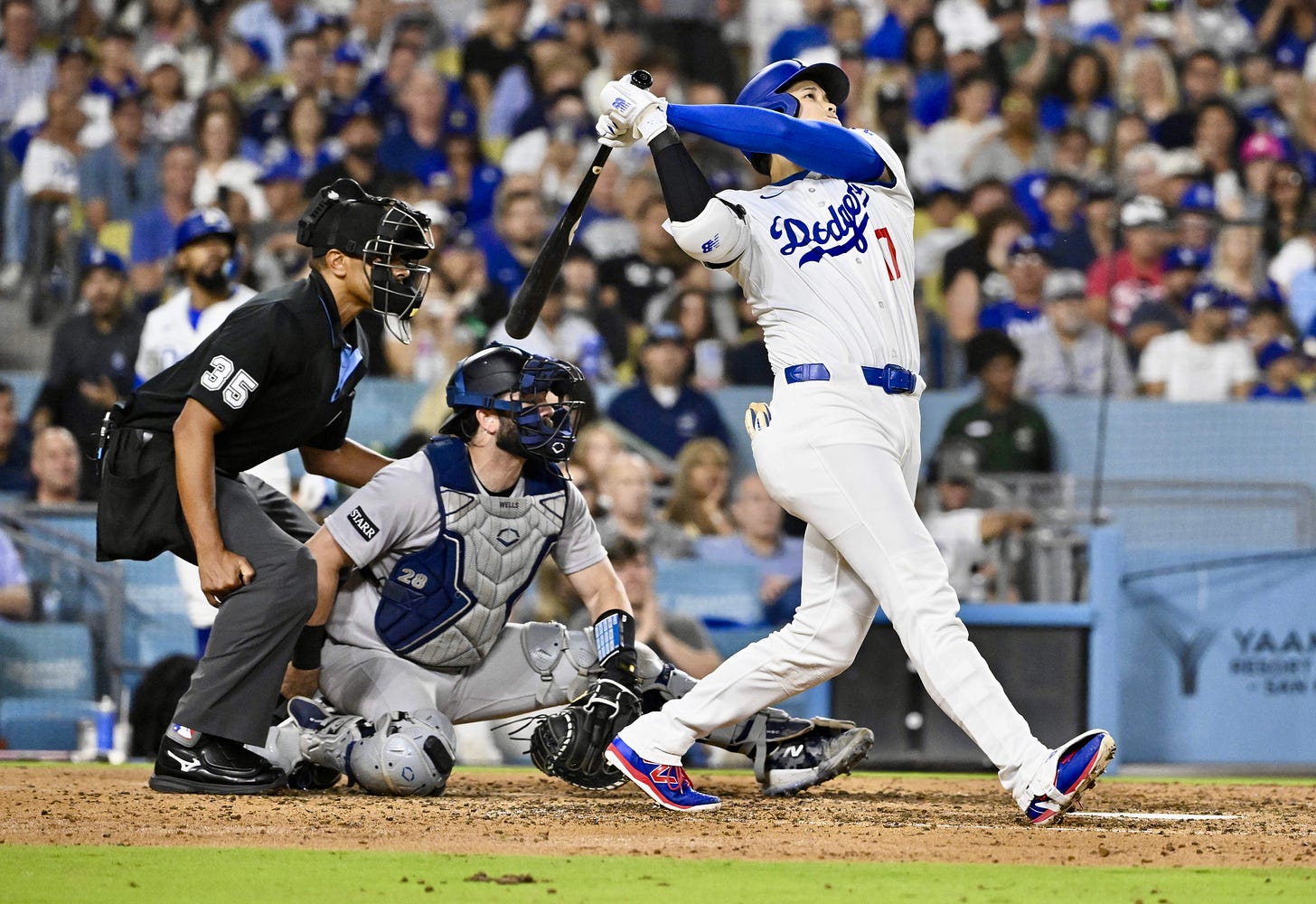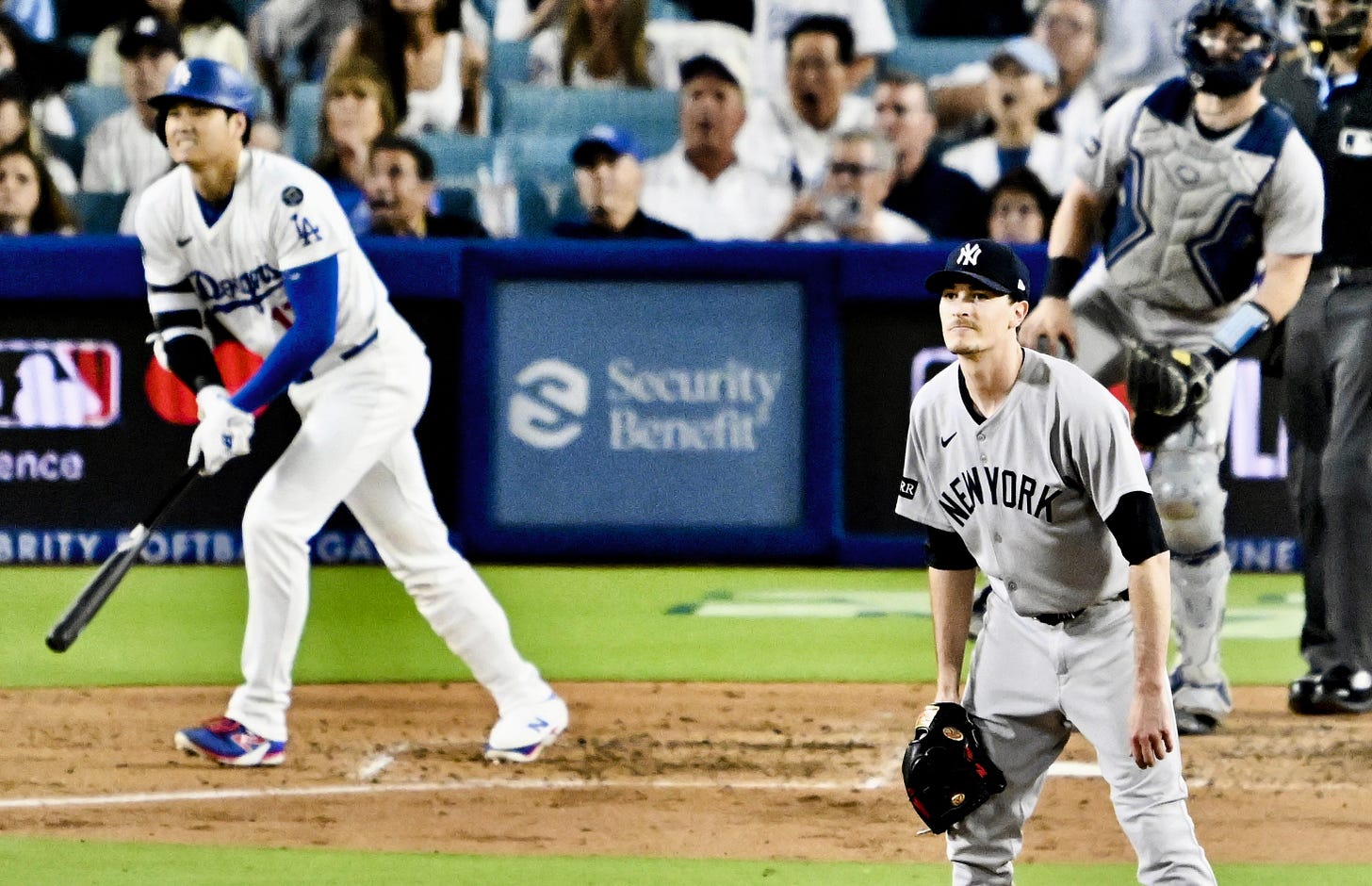

If you pitched Shohei Ohtani’s career as a movie script, every studio in town would likely pass on it. Too unrealistic. They would say, “Too far-fetched. One man cannot do that.” Then they would pause with waning confidence and ask, “Wait, is this a fictional baseball movie or a superhero movie?” But Ohtani is not fiction. He is the walking, swinging, flame-throwing contradiction of what we thought a human being could do.
And he is not based on a true story. He is a true story.
There has never been a Shohei Ohtani before, and there may never be another. As a player who continues to expand the boundaries of human capability, he has long since exhausted the adjectives we use to describe him. Years ago, I declared that we needed a new word. The only fitting descriptor for his impossibility would be a word derived from his name. Webster should reissue the dictionary to include an entry for an adjective that only and accurately describes him. In fact, they may need another entry just to define the concept of a person who can only be described by their own name.
I landed on “Ohtanic.” And, like those maddening dictionary entries you come across while helping your kid with their essay—the ones that use the word in the definition, trapping parents in a circular hell—it needed to be defined as “When Shohei Ohtani does something that only Shohei Ohtani can do.”
Circular? Yes.
True? Also yes.
Years ago, I appeared in the movie Summer Catch which starred Freddie Prinze Jr. and Jessica Biel. My scene came during the closing credits. I played myself (in a Phillies uniform) patrolling center field while Ken Griffey Jr. (aka Junior, then with the Reds) stepped in to face the rookie pitcher, Freddie’s character.
Being in a film about your profession grants you unsolicited permission to be a critic, and baseball movies are no exception. There is something about bad baseball on a screen that ruffles the soul. When the movie-star shortstop cannot throw or the batter swings like he is underwater with a pool noodle, the story loses its magic.
So, a baseball movie needs good baseball to pass muster.
During filming, I offered my unprompted advice to at least make my scene believable. The goal in this particular scene was for Griffey Jr.—who, in his prime, was fairly “Ohtanic” himself—to hit a towering home run over a sign in right-center field and into the upper deck. It was a difficult and long shot, deep into the stadium in a very specific section. Although they used a body double for some of Prinze Jr.’s pitching scenes, the double was a real pitcher at Duke University who threw an 87 mph sinker—not easy to square up, even for Junior, one of the all-time greats. All he could manage were two home runs down the right field line. Nowhere near where the cameras nor where the extras were placed.
So I walked in from center field and told a movie crew member, “Look, just have someone throw the ball over the fence. I will sell it.” He said he was hoping for “the perfect shot and perfect moment.” I responded with something like, “Understood, but we have a game to play today, so there’s not much time left to be perfect.”
Eventually, someone threw the ball over the fence. And I sold it.
I understood what he was going for, and I also knew that faking it by throwing a ball in the stands to simulate a home run risked violating the core sensibilities of any serious baseball fan. If the camera work did not sell it either, it could rank right down there with casting a left-handed shortstop as the star in a baseball movie. Something only acceptable in a straight-up comedy.
That experience came rushing back recently when I imagined sitting in a writers’ room for a baseball movie. Someone pitches the final scene:
“Okay, so for the big finale, our star player has the game of a lifetime.
He gets 6 hits.
He hits 3 home runs.
He steals 2 bases.
He racks up 5 extra-base hits.
He drives in 10 runs.
And, this is the kicker, in that same game, he becomes the first player ever to hit 50 home runs and steal 50 bases in a single season.”
I would have laughed that writer out of the room. “Come on,” I would say, “Don’t insult the baseball audience with impossible, over-the-top nonsense. It’s unrealistic. Silly. We don’t need another bad baseball movie.”
But that is exactly what Shohei Ohtani actually did.
That is why Ohtani is stranger than fiction, or maybe just too true for truth. He is human, no doubt. But with this uncanny ability to create human impossibility, consistently. He makes us feel small-minded, as if to say, “You didn’t think that was possible?” Partly because it has never been done before, but partly because your eyes cannot believe it. Wait, he started the All-Star Game as both the starting pitcher and then became the designated hitter? In the same game? When Ohtani is involved, you just know something is about to happen. He is a solar eclipse. You just need the right glasses.
I watched him take an inside pitch close to his body and, as a left-handed hitter, still hit it to the opposite field like a right-handed power hitter. And that was just with the bat. On the mound, he neutralized the best hitters in the game with ease. What would happen if he faced himself? I suspect the universe would collapse into a single point of light.
In many ways, he seems to have a certain respect for history. He is not just chasing stats for stats’ sake. He knows which milestones matter. We throw around “making history” too casually these days. Everything is history. But Ohtani knows the difference between noise and significance. And if he is not making history on the field, he is rewriting it.
Ohtani appears to understand what has come before, especially regarding the numbers that matter to baseball fans. And he does not just reach milestones, he creates new categories. Anyone can start a quirky stat line (first player with 200 hits whose Dad is from Trinidad), but does it resonate beyond self? That is the question.
Mickey Mantle once said, “If I knew 40-40 was gonna be such a big deal, I’d have done it every year.” Maybe players capable of doing more Ohtanic things simply played in the wrong era, or did not value stats that did not lead to bigger paychecks or more wins. Maybe Ohtani is paying attention and attuning us to new metrics of excellence. Plenty of power hitters could also steal bases. They just choose not to run. Stealing bases is exhausting. And once you have the power stats, you have job security. Stealing bases becomes the parsley on your plate. Unnecessary, bitter, but pretty. Okay, maybe that is just me.
Still, in the same season Ohtani hit 50+ home runs, he stole 50+ bases. If you are so busy trotting around the bases after home runs, how many other times do you need to get on base just to have the opportunity to steal 50? A lot of times.
So here is Ohtani. Fully human, doing what no baseball human has ever done. He exists in this strange stasis. Maybe like the Last Action Hero or Batman—super, but without superpowers. Ohtani does not need smoke and mirrors. He is right there, in the open. And that is the point.
Then again, if I were back in that writers’ room and someone said, “We are doing a superhero baseball movie, and in the final boss battle, the hero faces Historius—the villain of days past—and in that final game, Ohtani would:
Get 6 hits
Hit 3 home runs
Steal 2 bases
Rack up 5 extra-base hits
Drive in 10 runs
And become the first player ever to hit 50 home runs and steal 50 bases in a season.”
Funny, that sounds familiar…
But, I would still say:
“Not possible. Not believable, even for a fantasy movie.”
But that is Ohtani.
The superhero's contradiction lies in the struggle to remain human while wielding powers that set them apart, sometimes falling in love with these powers, other times resenting them. It can be a lonely space, doing more than any other human has done but still yearning to belong. The tension is what makes them real. Believable. They stretch our sense of what humanity can be, inhabiting a domain usually reserved for comic books and capes.
You don’t need superpowers to be super.
And yet we are left to wonder.
Time will tell. But for now, Ohtani just shows up, game after game, and bends reality into something new. Something we did not see coming.
Ohtani may not be a superhero.
No cape, no caves, no armor, no x-ray vision. No Batmobile.
But he embodies a kind of limitless greatness, rooted in craft, powered by discipline, and entirely human.
And still, that does not quite capture the essence of who he is and what he does.
There is only one word that comes close… Ohtanic.





Thank you, Doug! I have been following you for years. It’s great to see someone with your baseball experience and knowledge of the game give your assessment of Shohei. As you said, we quickly run out of words to describe his greatness. Finally, you did. “Ohtanic”! A coinage that will stick.
Doug, you’re a great writer… but I still hate the dodgers.